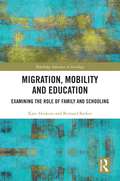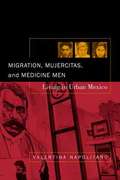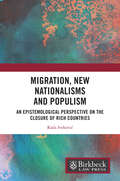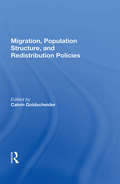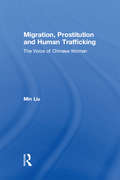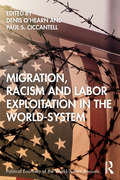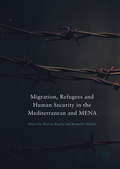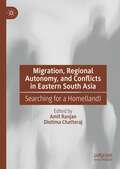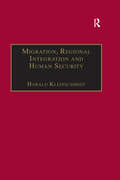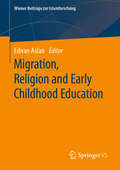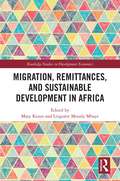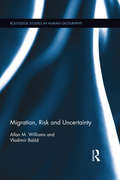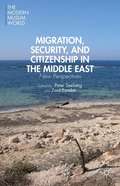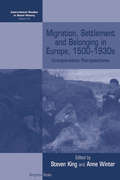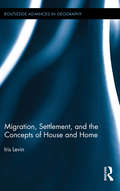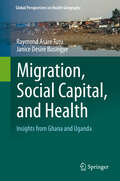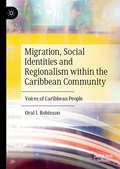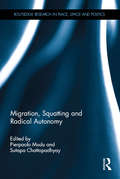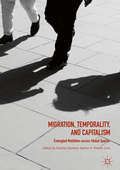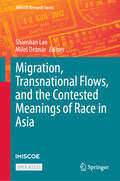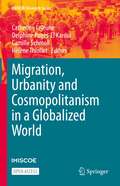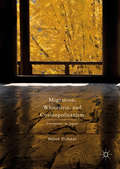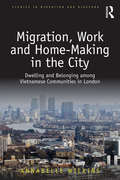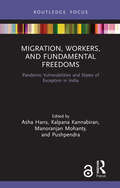- Table View
- List View
Migration, Mobility and Education: Examining the Role of Family and Schooling (Routledge Advances in Sociology)
by Kate Hoskins Bernard BarkerThis book examines the role of family and schooling through an interpretive, qualitative, intergenerational case study. It examines the formation of academic and vocational aspirations by second generation (G2) migrant students from diverse international backgrounds. Looking at the influence of family background, the changes and impacts of the migrant experience, and the effectiveness of the Academy, Hoskins and Barker interpret the successes of a cohort of sixth form migrant students from diverse backgrounds. They ask key questions about how participants perceive their lived experiences and imagined futures; how their aspirations and identities relate to their background circumstances; and in what ways the school and teachers enable and facilitate their future progress and potential career pathways. The findings challenge prevailing pessimism about the role of families and schools in enabling social mobility; and suggests the possibility that there may be important messages here for social mobility more widely. How do G2 migrants buck the trend?A valuable resource for scholars of social mobility as well as for educators – especially those working with migrant learners. The use of theory, policy analysis and genealogy will provide students with accessible social mobility case studies.
Migration, Mujercitas, and Medicine Men: Living in Urban Mexico
by Valentina NapolitanoValentina Napolitano explores issues of migration, medicine, religion, and gender in this incisive analysis of everyday practices of urban living in Guadalajara, Mexico.
Migration, New Nationalisms and Populism: An Epistemological Perspective on the Closure of Rich Countries
by Rada IvekovicThis book examines the antagonistic relationship between new European nationalisms as these often go hand-in-hand with populism, and the phenomenon of migration. Migration has become a significant issue both in Europe and the whole world. Although it has always existed, much of public opinion sees it now as a problem. The latter has been exaggerated through a crisis in hospitality exacerbated by the relatively recently constructed and misplaced feeling of a civilisational threat from islam. Migration is then countered by the escalation of new nationalisms, at least some of which are supported by populism. This book offers an understanding of this conjunction of migration and nationalism in the post-cold war European context. More specifically, the book takes up how the end of the simplified cold war cognitive binary means an unprecedented epistemological confusion and depoliticisation which takes migration as its target, but could resort to other targets too. Discussing the postcolonial background to the new migrations, the book also considers womens' rights, postsocialism and the relevance of the current pandemic, as the issue of migration is addressed in the context of the European crisis-ridden present. This wide-ranging interrogation of how contemporary European migration is conceived and understood will appeal to students, academics, activists, policy makers, and others with interests in contemporary migration, new nationalisms, populism, feminism, colonial, postcolonial, and decolonial issues, as well as socialism and postsocialism.
Migration, Population Structure, And Redistribution Policies
by Calvin GoldscheiderThis book analyses the links between migration and the composition, structure, and geographic distribution of populations. It discusses the evolution of population redistribution policies in Brazil, and examines internal migration between the 1930s and the 1980s.
Migration, Prostitution and Human Trafficking: The Voice of Chinese Women
by Min Liu"Migration, Prostitution, and Human Trafficking examines the nature, magnitude, and gravity of prostitution and sex trafficking--and the relationship between them--in contemporary China. By researching the backgrounds, circumstances, and other factors that drive Chinese women to migrate to Shenzhen, China, Liu hopes to shed light on the underlying reasons for their entry into the sex industry."
Migration, Racism and Labor Exploitation in the World-System (Political Economy of the World-System Annuals)
by Denis O’Hearn; Paul S. CiccantellThis book offers a historically sweeping yet detailed view of world-systemic migration as a racialized process. Since the early expansion of the world-system, the movement of people has been its central process. Not only have managers of capital moved to direct profitable expansion; they have also forced, cajoled or encouraged workers to move in order to extract, grow, refi ne, manufacture and transport materials and commodities. The book offers historical cases that show that migration introduces and deepens racial dominance in all zones of the world-system. This often forces indigenous and imported slaves or bonded labor to extract, process and move raw materials. Yet it also often creates a contradiction between capital’s need to direct labor to where it enables profitability, and the desires of large sections of dominant populations to keep subordinate people of color marginalized and separate. Case studies reveal how core states are concurrently users and blockers of migrant labor. Key examples are Mexican migrants in the United States, both historically and in contemporary society. The United States even promotes of an image of a society that welcomes the immigrant—while policy realities often quite different. Nonetheless, the volume ends with a vision of a future whereby communities from below, both activists and people simply following their communal interests, can come together to create a society that overcomes racism. Its final chapter is a hopeful call by Immanuel Wallerstein for people to make small changes that, together, can bring real about real, revolutionary change.
Migration, Refugees and Human Security in the Mediterranean and MENA
by Kenneth Christie Marion BoulbyThis book focuses on the Mediterranean/MENA migration crisis and explores the human security implications for migrants and refugees in this troubled region. Since the Arab uprisings of 2010/2011, the Middle East and North Africa region has experienced major political transformations and called into question the legitimacy of states in the region. Displaced populations continue to suffer due to the major conflicts in Syria, Iraq and elsewhere, causing fragmentation and dis-integration of communities. Contributors to this volume analyze how and why this crisis differs significantly from previous migration/refugee flows in the region, explain the historical and political antecedents of this crisis which have played a part in its shaping, and explore the relationship between human security and the protection of vulnerable individuals and groups.
Migration, Regional Autonomy, and Conflicts in Eastern South Asia: Searching for a Home(land)
by Amit Ranjan Diotima ChattorajDelving into the past and present of various secessionist movements in Northeast India, political conflict in Chittagong Hill Tracts in Bangladesh, a political movement for autonomy in Darjeeling hills in Eastern India, and the Rohingya migration crisis affecting India and Bangladesh, this book examines the volatile co-existence of competing population groups in Eastern South Asia. Through the conceptual lens of the ‘home’ and feeling of ‘homeland’ in Eastern South Asia, the authors seek answers to three complex but interrelated questions: why is Eastern South Asia facing so many political movements and conflicts? How have the political movements affected the region and people? Why is the number of migrants in this region so high? Answers to these questions are vital to those studying South Asia and interested in understanding this region.
Migration, Regional Integration and Human Security: The Formation and Maintenance of Transnational Spaces (Research in Migration and Ethnic Relations Series)
by Harald KleinschmidtThis original and timely book is the first to analyze the interconnectedness of migration, regional integration and the new security studies. Exploring the conflict between the actions of transnational migrants and state government policy in a series of theoretical chapters and regional case-studies, the book includes theoretical chapters which look at three key facets of the nation-state: population, territory and government, discussing the ways in which migration, regional integration and new security thinking challenge the accepted role and responsibilities of the state. Regional case-studies are also included which explore the specific challenges faced in regions including Central America, Asia and the Pacific and Central and Eastern Europe. As a book that asks crucial questions about the formulation of migration policies and the consequences of that success of failure, it will be essential reading for students and scholars of migration in sociology, politics and international relations and also for those with professional interests in the area.
Migration, Religion and Early Childhood Education (Wiener Beiträge zur Islamforschung)
by Ednan AslanAlthough it is rarely given sufficient consideration in either scholarly or political debates, early childhood education plays a crucial role in the integration process of young immigrants in European countries, since it not only enables the children to be integrated into society, both linguistically and culturally, but it also provides their parents with the opportunity, through their children, to view the society more directly and to reflect on their own values in the encounter, or to potentially seek new orientations. The quality of young migrants’ educational achievements, which have repeatedly caused current political debates in European countries, should not be considered independently of the elementary education measures since they are very closely related.Prof. Dr. Ednan Aslan is Chair of Islamic Religious Education at the Institute for Islamic Theological Studies at the University of Vienna.
Migration, Remittances, and Sustainable Development in Africa (Routledge Studies in Development Economics)
by Maty Konte Linguère Mously MbayeThis book provides a strong multidisciplinary examination of the links between migration, remittances and sustainable development in Africa. It makes evidence-based policy recommendations on migration to help achieve the Sustainable Development Goals. The key themes examined are migration and remittances, and their relations with the following issues: economic transformation, education and knowledge, corruption and conflict. Cross-cutting issues such as gender equality and youth are weaved throughout the chapters, and a rich range of country contexts are presented. The volume also discusses challenges in managing migration flows. It will be of interest to advanced students, academics and policy makers in development economics and sustainable development.
Migration, Risk and Uncertainty (Routledge Studies in Human Geography #53)
by Allan M. Williams Vladimír BalážMigration is one of the driving forces of economic and social change in the modern world. It is both informed by risk and a generator of risk, whether for individuals, households, communities or societies. Although the relationship between migration and risk is widely acknowledged, it has long been neglected in academic research, with a few exceptions such as household diversification strategies. Instead, risk is assumed to be implicit in economic or social models, rather than being explicitly theorised or analysed. This book represents the first major review of these key relationships. It draws on a wide range of theories - from economics, psychology, sociology, anthropology and geography - and an equally broad range of empirical material, to provide a highly original overview.
Migration, Security, And Citizenship In The Middle East
by Peter Seeberg Zaid EyadatThis volume addresses new tendencies related to migration from a Middle Eastern and Mediterranean perspective and with an emphasis on security and citizenship. Contributors aim not only to intervene in scholarly debates surrounding citizenship and migration but also to contribute to policy-oriented discussions related to migration.
Migration, Settlement and Belonging in Europe, 1500-1930s: Comparative Perspectives
by Steven King Anne WinterThe issues around settlement, belonging, and poor relief have for too long been understood largely from the perspective of England and Wales. This volume offers a pan-European survey that encompasses Switzerland, Prussia, Belgium, the Netherlands, and Britain. It explores how the conception of belonging changed over time and space from the 1500s onwards, how communities dealt with the welfare expectations of an increasingly mobile population that migrated both within and between states, the welfare rights that were attached to those who "belonged," and how ordinary people secured access to welfare resources. What emerged was a sophisticated European settlement system, which on the one hand structured itself to limit the claims of the poor, and yet on the other was peculiarly sensitive to their demands and negotiations.
Migration, Settlement, and the Concepts of House and Home (Routledge Advances in Geography)
by Iris LevinHow do migrants feel "at home" in their houses? Literature on the migrant house and its role in the migrant experience of home-building is inadequate. This book offers a theoretical framework based on the notion of home-building and the concepts of home and house embedded within it. It presents innovative research on four groups of migrants who have settled in two metropolitan cities in two periods: migrants from Italy (migrated in the 1950s and 1960s) and from mainland China (migrated in the 1990s and 2000s) in Melbourne, Australia, and migrants from Morocco (migrated in the 1950s and 1960s) and from the former Soviet Union (migrated in the 1990s and 2000s) in Tel Aviv, Israel. The analysis draws on qualitative data gathered from forty-six in depth interviews with migrants in their home-environments, including extensive visual data. Levin argues that the physical form of the house is meaningful in a range of diverse ways during the process of home-building, and that each migrant group constructs a distinct form of home-building in their homes/houses, according to their specific circumstances of migration, namely the origin country, country of destination and period of migration, as well as the historical, economic and social contexts around migration.
Migration, Social Capital, and Health: Insights from Ghana and Uganda (Global Perspectives on Health Geography)
by Raymond Asare Tutu Janice Desire BusingyeThis book brings readers the first scientific publication, using a mixed-method approach, on the internal migration dynamics regarding disease ecologies of informality and the interactions between social capital, lifestyles, health literacy, and health outcomes in the context of informal settlements in two developing countries - Ghana and Uganda. Through the prism of the concepts of place and scale, the book demonstrates the myriad of ways by which place or context directly and indirectly influence migrant's health knowledge, literacy, and outcomes in poor urban slums. Readers will learn about the multi-faceted linkages between social capital, acculturation, and health in places of deprivation via quantitative methods (e.g. surveys) and qualitative methods such as focus group discussions, in-depth interviews, concept mapping, and body health mapping. Chapters 1-2 provide an overview of internal migration into urban slums of Ghana and Uganda, and discuss the intersections between migration, social capital, and health in a global context. Chapters 3-7 address disease patterns, environmental risks to health, health literacy of migrants, social capital and acculturation, and social capital and health. The book will be of interest to professors and students, as well as policy makers in low to middle income countries for planning targeted interventions.
Migration, Social Identities and Regionalism within the Caribbean Community: Voices of Caribbean People
by Oral I. RobinsonThis book offers a theoretical and substantive analysis of intra-Caribbean migration, perception of regionalism, and the construction of identities among Caribbean nationals. Through a multi-methods study in the 15 member countries of the Caribbean community, Oral Robinson explores how intra-Caribbean migrants experience living within different member countries, and how these experiences and perceptions influence ideas about citizenship, belonging, and identity. Responding directly to the lack of scholarship on how Caribbean nationals feel about integration and/or free movement within their own countries and other Caribbean countries, this volume attempts to understand Caribbean societies historically, theoretically, and methodologically; proposes bases of social identities in the Caribbean; and examines how intra-Caribbean migrants negotiate their identities and narrate their lived experiences as intra-Caribbean migrants. The book offers policy solutions based upon its findings, reconciling practice, theory, and migration policies in the Caribbean.
Migration, Squatting and Radical Autonomy: Resistance and Destabilization of Racist Regulatory Policies and B/Ordering mechanisms (Routledge Research in Place, Space and Politics)
by Pierpaolo Mudu Sutapa ChattopadhyayThis book offers a unique contribution, exploring how the intersections among migrants and radical squatter’s movements have evolved over past decades. The complexity and importance of squatting practices are analyzed from a bottom-up perspective, to demonstrate how the spaces of squatting can be transformed by migrants. With contributions from scholars, scholar-activists, and activists, this book provides unique insights into how squatting has offered an alternative to dominant anti-immigrant policies, and the implications of squatting on the social acceptance of migrants. It illustrates the different mechanisms of protest followed in solidarity by migrant squatters and Social Center activists, when discrimination comes from above or below, and explores how can different spatialities be conceived and realized by radical practices. Contributions adopt a variety of perspectives, from critical human geography, social movement studies, political sociology, urban anthropology, autonomous Marxism, feminism, open localism, anarchism and post-structuralism, to analyze and contextualize migrants and squatters’ exclusion and social justice issues. This book is a timely and original contribution through its exploration of migrations, squatting and radical autonomy.
Migration, Temporality, and Capitalism: Entangled Mobilities Across Global Spaces
by Winnie Lem Pauline Gardiner BarberBringing together a range of illustrative case studies coupled with fresh theoretical insights, this volume is one of the first to address the complexities and contradictions in the relationship between migration, time, and capitalism. While temporal reckoning has long fascinated anthropologists, few studies have sought to confront how capitalism fetishizes time in the production of global inequalities—historically and in the contemporary world. As it explores how the agendas of capitalism condition migration in Europe, North America, and Oceania, this collection also examines temporality as a feature of migrants’ experiences to ultimately provide a theoretically robust and ethnographically informed investigation of migration and temporality within a framework defined by the political economy of capitalism.
Migration, Transnational Flows, and the Contested Meanings of Race in Asia (IMISCOE Research Series)
by Shanshan Lan Miloš DebnárThis open access edited volume addresses the multi-layered relations between migration, transnational flows, and the contested meanings of race in Asia. It tries to answer the following questions: how do migration and transnational flows from the Western world impact racial knowledge formation in Asian societies? To what extent do they challenge, perpetuate, and reshape unequal power relations based on the intersection of race, gender, class, nationality, citizenship, and migration status in Asia? How are dominant Western racial categories such as race, whiteness, and blackness redefined and reconstructed in the context of the Covid-19 pandemic, when transnational mobility became both heavily restricted and stigmatized ? The book is divided into three parts: Race, Language and Migration status, Covid-19 and the Dynamics of Racialization, Gender and Interracial Encounters. This book positions itself in the nexus of race, migration and pandemic research and will make a significant contribution to critical race studies, whiteness studies, globalization, multiculturalism, and social transformation in Asia. This book is aimed at students and scholars in race and migration studies in Asia and beyond. This is an open access book.
Migration, Urbanity and Cosmopolitanism in a Globalized World (IMISCOE Research Series)
by Catherine Lejeune Delphine Pagès-El Karoui Camille Schmoll Hélène ThiolletThis open access book draws a theoretically productive triangle between urban studies, theories of cosmopolitanism, and migration studies in a global context. It provides a unique, encompassing and situated view on the various relations between cosmopolitanism and urbanity in the contemporary world. Drawing on a variety of cities in Latin America, Europe, Asia, Africa and North America, it overcomes the Eurocentric bias that has marked debate on cosmopolitanism from its inception. The contributions highlight the crucial role of migrants as actors of urban change and targets of urban policies, thus reconciling empirical and normative approaches to cosmopolitanism. By addressing issues such as cosmopolitanism and urban geographies of power, locations and temporalities of subaltern cosmopolites, political meanings and effects of cosmopolitan practices and discourses in urban contexts, it revisits contemporary debates on superdiversity, urban stratification and local incorporation, and assess the role of migration and mobility in globalization and social change.
Migration, Whiteness, and Cosmopolitanism: Europeans in Japan
by Miloš DebnárThis book analyzes the increase in contemporary European migration to Japan, its causes and the lives of Europeans in Japan. Desconstructing the picture of highly skilled, privileged, cosmopolitan elites that has been frequently associated with white or Western migrants, it focuses on the case of Europeans rather than Westerners migrating to a highly developed, non-Western country as Japan, this book offers new insights on increasing diversity in migration and its outcomes for integration of migrants. The book is based on interviews with 57 subjects from various parts of Europe occupying various positions within Japanese society. What are the motivations for choosing Japan, how do white migrants enjoy the ‘privilege’ based on their race, what are its limits, and to what extent are the social worlds of such migrants characterized by cosmopolitanism rather than ethnicity? These are the main questions this book attempts to answer.
Migration, Work and Home-Making in the City: Dwelling and Belonging among Vietnamese Communities in London (Studies in Migration and Diaspora)
by Annabelle WilkinsThis book explores the relationships between home, work and migration among Vietnamese people in East London, demonstrating the diversity of home-making practices and forms of belonging in relation to the dwelling, workplace and wider city. Engaging with wider scholarship on transnationalism, urban mobilities and the geopolitical dimensions of home among migrants and diasporic communities, the author draws on ethnographic work to examine the experiences of people who migrated from Vietnam to London at different times and in diverse circumstances, including individuals who arrived as refugees in the 1970s, as well as those who have migrated for work or education in recent years. Migration, Work and Home-Making in the City thus sheds new light on the social, material and spiritual practices through which people create senses of home that connect them with their country of origin, and reveals how home-making is constrained by immigration policies, insecure housing and precarious work, thus highlighting the barriers to belonging in the city.
Migration, Workers, and Fundamental Freedoms: Pandemic Vulnerabilities and States of Exception in India
by Kalpana Kannabiran Manoranjan Mohanty Asha HansThe COVID-19 pandemic resulted in a mass exodus of India’s migrant workers from the cities back to the villages. This book explores the social conditions and concerns around health, labour, migration, and gender that were thrown up as a result of this forced migration.The book examines the failings of the public health systems and the state response to address the humanitarian crisis which unfolded in the middle of the pandemic. It highlights how the pandemic-lockdown disproportionately affected marginalised social groups – Dalits and the Adivasi communities, women and Muslim workers. The book reflects on the socio-economic vulnerabilities of migrant workers, their rights to dignity, questions around citizenship, and the need for robust systems of democratic and constitutional accountability. The chapters also critically look at the gendered vulnerabilities of women and non-cis persons in both public and private spaces, the exacerbation of social stratification and prejudices, incidents of intimidation by the administration and the police forces, and proposed labour reforms which might create greater insecurities for migrant workers.This important and timely book will be of great interest to researchers and students of sociology, public policy, development studies, gender studies, labour and economics, and law.
Migration, Workers, and Fundamental Freedoms: Pandemic Vulnerabilities and States of Exception in India
by Asha Hans, Kalpana Kannabiran, Manoranjan Mohanty, and PushpendraThe COVID-19 pandemic resulted in a mass exodus of India’s migrant workers from the cities back to the villages. This book explores the social conditions and concerns around health, labour, migration, and gender that were thrown up as a result of this forced migration. The book examines the failings of the public health systems and the state response to address the humanitarian crisis which unfolded in the middle of the pandemic. It highlights how the pandemic-lockdown disproportionately affected marginalised social groups – Dalits and the Adivasi communities, women and Muslim workers. The book reflects on the socio-economic vulnerabilities of migrant workers, their rights to dignity, questions around citizenship, and the need for robust systems of democratic and constitutional accountability. The chapters also critically look at the gendered vulnerabilities of women and non-cis persons in both public and private spaces, the exacerbation of social stratification and prejudices, incidents of intimidation by the administration and the police forces, and proposed labour reforms which might create greater insecurities for migrant workers. This important and timely book will be of great interest to researchers and students of sociology, public policy, development studies, gender studies, labour and economics, and law.
